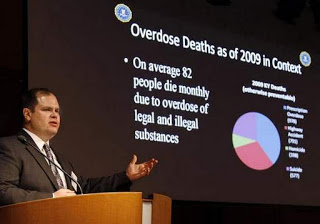Shocking realities of prescription pill abuse drive another summit to get everyone in harness to fight it

Kentucky Health News
Prescription drug abuse has become so prevalent in parts of Kentucky, people are buying Mason jars of clean urine at flea markets and under the table at tobacco stores so they can pass drug tests.
Almost two-thirds of Kentuckians have used prescription drugs for non-prescription reasons, 30 percentage points higher than the rest of the country.
 |
| FBI intelligence analyst Anthony Carter detailed the problem. (Photo by James Crisp for The Courier-Journal) |
Those were just some of the sad, startling facts that surfaced Wednesday in Lexington during the Kentucky Prescription Drug Summit, the second comprehensive, statewide gathering on the subject in two weeks. The summit was sponsored by the two U.S. attorneys for Kentucky hosted by the University of Kentucky and brought together law enforcement, physicians and the pharmaceutical community to learn more about the problem and cooperate in fighting it.
“I think a lot of our people have had enough,” said Kerry Harvey, the chief federal prosecutor for Eastern Kentucky. That’s where the problem is worst, but speakers made clear it is statewide.
The state has electronically tracked prescriptions since 2000, but Attorney General Jack Conway said only about 25 percent of doctors use the Kentucky All-Schedule Prescription Electronic Reporting system, and KASPER’s data are “just sitting there and law enforcement are not able to access it” to proactively search for people getting an unusual amount of drugs.
Beshear recently appointed a panel of health-care providers to establish guidelines to identify over-prescribers through KASPER, and his budget proposal would put more money into the system and set up the state’s first substance-abuse treatment program for Medicaid recipients.
House Speaker Greg Stumbo, D-Prestonsburg, is expected to file a bill that would require drug prescribers to use KASPER. That bill or another would also require pain clinics to be owned by doctors.
The speeches from officials were leavened with personal stories of drug abuse, death and near-death.
Marine Lance Cpl. Daniel Gross, 26, said he was 21 when his addiction started. He was introduced to pain pills shortly after a roadside bomb exploded beside his Humvee in Iraq in 2006. With his right foot shattered, his other one broken and his brain injured from the blast, he was prescribed Percocet and oxycodone. With prescriptions “overflowing” at Camp Lejeune, N.C., taking pills became commonplace. “If I ran out, I got them from someone else,” Gross said.
UK President Eli Capilouto told the crowd that the land-grant university needs to be a partner in solving such problems, and the extent of it had become clearer to him the day before, when he met with local extension agents: “This issue came to the forefront.”
“This has to be a group effort” among public servants and health-care providers, said Dr. Lon Hays, chair of the UK Psychiatry Department. Too often, he said, providers use “the big gun” of a strong painkiller. “We need to exhaust other methods of pain control before we go to that method of pain control.”
For more coverage, from The Courier-Journal or the Lexington Herald-Leader, click here or here.
Kentucky Health News is a service of the Institute for Rural Journalism and Community Issues, based in the School of Journalism and Telecommunications at the University of Kentucky, with support from the Foundation for a Healthy Kentucky.